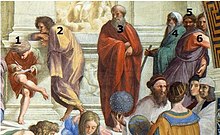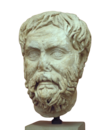Academic skepticism

Academic skepticismrefers to theskepticalperiod of theAcademydating from around 266 BCE, whenArcesilausbecamescholarch,until around 90 BCE, whenAntiochus of Ascalonrejected skepticism, although individual philosophers, such asFavorinusand his teacherPlutarch,continued to defend skepticism after this date. Unlike the existing school of skepticism, thePyrrhonists,they maintained thatknowledge of things is impossible.Ideas or notions are never true; nevertheless, there are degrees of plausibility, and hence degrees of belief, which allow one to act. The school was characterized by its attacks on theStoics,particularly theirdogmathatconvincing impressionsled to trueknowledge.The most important Academics wereArcesilaus,Carneades,andPhilo of Larissa.The most extensive ancient source of information about Academic skepticism isAcademica,written by the Academic skeptic philosopherCicero.
Overview[edit]
| Part ofa serieson |
| Pyrrhonism |
|---|
 |
|
|
Greekphilosophical skepticism,as a distinctphilosophical movement,began withPyrrho of Elis(c. 360– c. 270 BCE), with antecedents inXenophanesandDemocritus.His followers, thePyrrhonists,pointed out theproblem of the criterion:that our theories and our sense impressions are unable to accurately distinguish truth from falsehood; therefore we mustsuspend judgment(epoche).[1]They were consistent enough to extend their doubt even to their own principle of doubt, making their skepticism universal, thus escaping reproach for basing it upon a freshdogmatism.Mental imperturbability (ataraxia) was the result to be attained by cultivating such a frame of mind.[1]
Around 266 BCE,Arcesilausbecame head of thePlatonic Academy.He adopted skepticism as a central tenet ofPlatonism,making Platonism nearly the same as Pyrrhonism.[2]After Arcesilaus, the Academics diverged from Pyrrhonism.[3]This skeptical period of ancient Platonism, fromArcesilaustoPhilo of Larissa,became known as thenew Academy,although some ancient authors added further subdivisions, such as amiddle Academy.Following the death of the PyrrhonistTimon of Phlius,the Platonic Academy became the primary advocate of skepticism until the mid-first century BCE.[4]While early Academic skepticism was influenced in part by Pyrrho,[5]it grew more and more dogmatic untilAenesidemus,in the first century BCE, broke with the Academic skeptics and adopted Pyrrhonism, denouncing the Academy as "Stoicsfighting against Stoics. "[6]
The Academics did not doubt the existence oftruth;they just doubted that humans had the capacities for obtaining it.[7]They based this position onPlato'sPhaedo,[8]in which Socrates discusses how knowledge is not accessible to mortals.[9]
While the objective of the Pyrrhonists was the attainment ofataraxia,after Arcesilaus the Academics did not hold up ataraxia as the central objective. The Academics focused on criticizing thedogmasof other schools of philosophy, in particular of the dogmatism of theStoics.[1]They acknowledged some vestiges of a moral law within, at best but a plausible guide, the possession of which, however, formed the real distinction between thesageand the fool.[7]Slight as the difference may appear between the positions of the Academics and the Pyrrhonists, a comparison of their lives leads to the conclusion that a practical philosophical moderation was the characteristic of the Academics[7]whereas the objectives of the Pyrrhonists were more psychological. The second-century Roman historianAulus Gelliusdescribed the distinction between the Academic skeptics and the Pyrrhonists as follows:
"...the Academics apprehend (in some sense) the very fact that nothing can be apprehended, and they determine (in some sense) that nothing can be determined, whereas the Pyrrhonists assert that not even that seems to be true, since nothing seems to be true."[10]
Arcesilaus[edit]
Up toArcesilaus,thePlatonic Academyaccepted the principle of finding a general unity in all things, by the aid of which a principle of certainty might be found.[11]Arcesilaus, however, broke new ground by attacking the very possibility of certainty and denied the possibility of even the Socratic minimum of certainty: "I cannot know even whether I know or not."[11]
The doctrines of Arcesilaus, which must be gathered from the writings of others,[12]represent an attack on the Stoicphantasia kataleptike(criterion) and are based on the skepticism which was latent in the later writings ofPlato.[13]Arcesilaus held that strength of intellectual conviction cannot be regarded as valid, inasmuch as it is characteristic equally of contradictory convictions. The uncertainty of sense data applies equally to the conclusions of reason, and therefore man must be content with probability which is sufficient as a practical guide. "We know nothing, not even our ignorance"; therefore the wise man will be content with anagnosticattitude.[13]
Carneades[edit]

The next stage in Academic skepticism was the moderate skepticism ofCarneades,which he said owed its existence to his opposition toChrysippus.[11]
To the Stoic theory of perception, thephantasia kataleptike,by which they expressed a conviction of certainty arising from impressions so strong as to amount to science, he proposed the doctrine ofacatalepsia,which denied any necessary correspondence betweenperceptionsand the objects perceived.[11]All our sensations are relative, and acquaint us, not with things as they are, but only with the impressions that things produce upon us. Experience, he said, clearly shows that there is no true impression. There is no notion that may not deceive us; it is impossible to distinguish between false and true impressions; therefore the Stoicphantasia kataleptikemust be given up. There is no phantasia kataleptike ( "criterion" ) of truth. Carneades also assailedStoic theology and physics.In answer to the doctrine of final cause, of design in nature, he pointed to those things which cause destruction and danger to man, to theevilcommitted by men endowed with reason, to the miserable condition of humanity, and to the misfortunes that assail the good man. There is, he concluded, no evidence for the doctrine of a divine superintending providence. Even if there were orderly connexion of parts in theuniverse,this may have resulted quite naturally. No proof can be advanced to show that this world is anything but the product of natural forces.[14]
Knowledge being impossible, a wise man should practiceepoche(suspension of judgment).[14]He will not even be sure that he can be sure of nothing. He saved himself, however, from absolute skepticism by the doctrine of plausibility, which may serve as a practical guide in life.[11]Ideas or notions are never true, but only plausible; nevertheless, there are degrees of plausibility, and hence degrees of belief, leading to action. According to Carneades, an impression may be plausible in itself; plausible and uncontradicted (not distracted by synchronous sensations, but shown to be in harmony with them) when compared with others; plausible, uncontradicted, and thoroughly investigated and confirmed. In the first degree there is a strong persuasion of the propriety of the impression made; the second and third degrees are produced by comparisons of the impression with others associated with it, and an analysis of itself.[14]Carneades left no written works; his opinions seem to have been systematized by his pupilClitomachus,whose works, which included one "on suspension of judgment",were made use of byCicero.[15]
Philo of Larissa[edit]
InPhilo of Larissa,we find a tendency not only to reconcile the internal divergences of the Academy itself, but also to connect it with parallel systems of thought.[11]In general, his philosophy was a reaction against the skeptic or agnostic position of the middle and new Academy in favor of thedogmatismof Plato.[16]Philo of Larissa endeavored to show that Carneades was not opposed to Plato, and further that the apparent antagonism betweenPlatonismand Stoicism was because they were arguing from different points of view. From this syncretism emerged the eclecticmiddle PlatonismofAntiochus of Ascalon,the last product of Academic development.[11]
See also[edit]
Notes[edit]
- ^abcOne or more of the preceding sentences incorporates text from a publication now in thepublic domain:Chisholm, Hugh,ed. (1911). "Scepticism".Encyclopædia Britannica.Vol. 24 (11th ed.). Cambridge University Press. pp. 306–309.
- ^Sextus Empiricus,"Outlines of Pyrrhonism" I.33.232
- ^Sextus Empiricus, "Outlines of Pyrrhonism" I.33.225–231
- ^Thorsrud, Harald (2009).Ancient Scepticism.Stocksfield [U.K.]: Acumen. pp. 120–121.ISBN978-1844654093.OCLC715184861.
Pyrrhonism, in whatever form it might have taken after Timon's death in 230 BCE, was utterly neglected until Aenesidemus brought it back to public attention
- ^Thorsrud 2014,p. 45.
- ^Thorsrud 2014,pp. 102–103.
- ^abc
 This article incorporates text from a publication now in thepublic domain:Smith, William,ed. (1870). "Arcesilaus".Dictionary of Greek and Roman Biography and Mythology.
This article incorporates text from a publication now in thepublic domain:Smith, William,ed. (1870). "Arcesilaus".Dictionary of Greek and Roman Biography and Mythology.
- ^Phaedo,64–67
- ^Veres, Máté (2009)."Carlos Lévy, Les Scepticismes; Markus Gabriel, Antike und moderne Skepsis zur Einführung".Rhizai. A Journal for Ancient Philosophy and Science.6(1): 107.: 111
- ^Gellius, Aulus (2008).Noctes Atticae.Josef Feix (3. Dr ed.). Paderborn: Schöningh.ISBN978-3140107143.OCLC635311697.
- ^abcdefgOne or more of the preceding sentences incorporates text from a publication now in thepublic domain:Chisholm, Hugh,ed. (1911). "Academy, Greek".Encyclopædia Britannica.Vol. 1 (11th ed.). Cambridge University Press. pp. 105–106.
- ^Cicero,Acad.i. 12, iv. 24;De Orat.iii. 18; Diogenes Laertius iv. 28; Sextus Empiricus,Adv. Math.vii. 150,Pyrrh. Hyp.i. 233
- ^abOne or more of the preceding sentences incorporates text from a publication now in thepublic domain:Chisholm, Hugh,ed. (1911). "Arcesilaus".Encyclopædia Britannica.Vol. 2 (11th ed.). Cambridge University Press. p. 342.
- ^abcOne or more of the preceding sentences incorporates text from a publication now in thepublic domain:Chisholm, Hugh,ed. (1911). "Carneades".Encyclopædia Britannica.Vol. 5 (11th ed.). Cambridge University Press. pp. 363–364.
- ^One or more of the preceding sentences incorporates text from a publication now in thepublic domain:Chisholm, Hugh,ed. (1911). "Clitomachus".Encyclopædia Britannica.Vol. 6 (11th ed.). Cambridge University Press. p. 531.
- ^One or more of the preceding sentences incorporates text from a publication now in thepublic domain:Chisholm, Hugh,ed. (1911). "Philo of Larissa".Encyclopædia Britannica.Vol. 21 (11th ed.). Cambridge University Press. p. 413.
References[edit]
- Thorsrud, Harald (2014).Ancient Scepticism.Routledge.ISBN978-1-317-49283-2.
